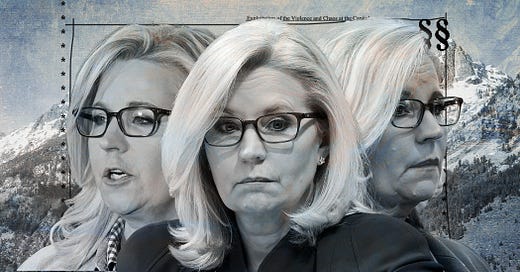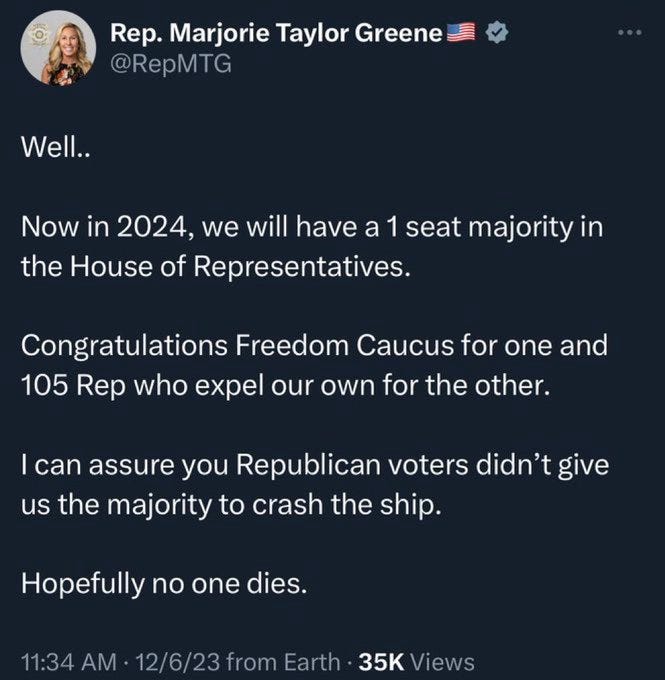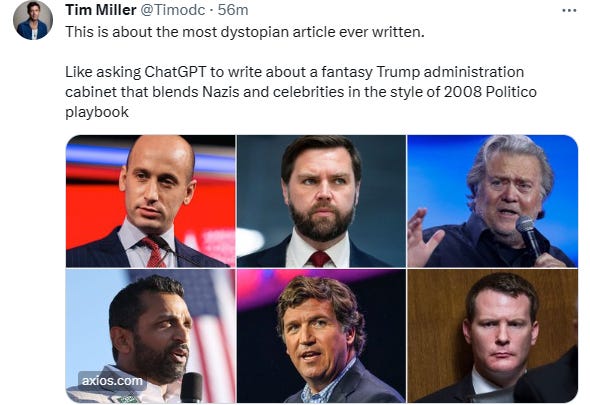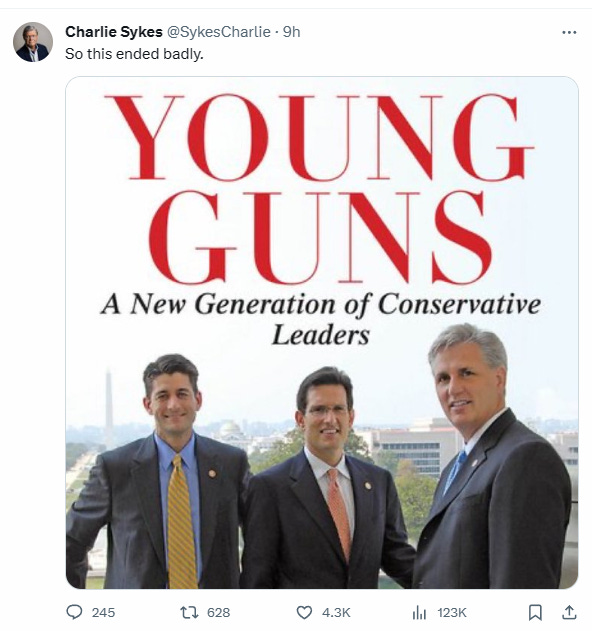
Catching up a bit here:
Sure I’ll be a dictator, Trump says. But only a for a day. “You're not going to be a dictator, are you?' I said, 'No, no, no, other than day one. We're closing the border and we're drilling, drilling, drilling. After that, I'm not a dictator.'"
Seth Meyers’ reaction:
"Oh, well, if it's just for one day, sure, by all means. What could possibly go wrong?" reacted Meyers. "That's like Jason [in Friday 13th] saying he'll only go on a murderous rampage the first day of summer camp, and then on day two, canoeing."
(Apparently, Steve Bannon is quite butt-hurt about the whole thing. “Bannon Loses It on Hannity Over Trump 'Dictator' Question”- Mediaite)
Fake elector elector update: Trump 'fake electors' in Wisconsin acknowledge Biden won the election / Nevada grand jury indicts six Republicans who falsely certified that Trump won the state in 2020
Reagan rolls over his grave. Again. “Senate Republicans block funding bill that included aid for Ukraine and Israel.”
Kevin says good-bye, with a huge FU to his colleagues. His speakership began in chaos and humiliation and ended in chaos and humiliation. And as McCarthy exits, his parting gift to the folks who ousted him: a vanishing majority.
MTG is not taking it well.
The debate for second place. Nikki was targeted. DeSantis danced and dodged. Vivek sh*t himself. Christie was a magnificent beast. “Chris Christie’s Best Lines from the GOP Debate: ‘Voldemort’ Trump, ‘Blowhard’ Ramaswamy and ‘Afraid’ DeSantis” - The Messenger. (Stay tuned for complete debate coverage on today’s Bulwark podcast with A.B. Stoddard.)
Meanwhile: Cheney’s memoir tops charts, quickly sells out on Amazon.
Happy Thursday.
The Bulwark Interview: Liz Cheney
On Wednesday, Liz Cheney joined me to discuss her new book: “Oath and Honor.”
You can watch us on the Bulwark YouTube channel here:
Some (lightly) edited excerpts from our conversation:
Would Trump use the military to stay in power?
CJS: “How close did we come? You played a central role in getting all of the living secretaries of defense to sign a letter saying that the Department of Defense should play no role. And I remember at the time thinking, oh my God, how alarmed must they have been to sign that letter? How dangerous was it, Liz?”
Cheney: “It turned out that it was even more dangerous than I knew at the time.
At the time, certainly, as you point out, all of us who pay attention to these things were watching these firings, were watching him put unqualified loyalists in place, listening to Mike Flynn suggest he should deploy the military to rerun the election or to seize voting machines. So, there was a lot of concern, but at all times — and I think people still experience this today — you're sort of held back from imagining the worst because it's never happened in America.
So, as we watched this unfold, and then there was a piece by David Ignatius in The Post talking about these concerns, and he suggested that what should happen is a delegation of senior Republicans should go privately to Trump and tell him to concede.
We all knew that was not ever going to work, that there had to be a public warning.
And it was a very chilling public warning, but it was intentionally very direct and named the acting secretary of defense specifically by name, made clear that there'd be personal criminal liability for people who attempted to carry out illegal orders or attempted to use the military to involve them in our election process.
It was very concerning at the time. Then when we were working on the select committee investigation, and it became clear that Donald Trump had in fact threatened the chief of staff of the Army, simply for the act of issuing a statement saying the military has no role in our election process.”
CJS: “You write that he was “enraged” when leaders of the military said the military is not going to have any role in this election.”
Cheney: “Right.”
CJS: “So, clearly this was something that mattered a great deal to him at that time.”
Cheney: “Yeah, and we also learned through the investigation more about what happened in the meeting on December 18th in the White House, when Mike Flynn was proposing the very things that he'd been talking about in some of his public interviews.
And you know [Flynn] still talks about those things today and Donald Trump has said that he will be one of the senior people in his administration.
So it's a very, very real threat.”
On Kevin McCarthy
Liz Cheney: Well, I think that he's a pathetic figure in many ways in our history.
But I also think it's important not to minimize the damage that he did, because even though he's somebody who didn't seem to have strong ideological beliefs, he was leading the Republicans in the House. And at each moment when his determination to do the right thing could have made a difference, he determined instead to do the wrong thing.
So, I talk in the book, for example, about the whole process of objecting to electoral votes. And we'd obviously gone through a huge debate internally about it. But once the violence happened, I obviously made clear that I believed it was unconstitutional to object.
And I certainly assumed that in the hours after the attack on the Capitol, there would not be a continuation of the objections. And in fact, that's what Kevin told me, he was not going to continue the objections—but then he did.
And it's just an example where there are these moments where because he was the leader, had he done the right thing, he could have taken a lot of people with him. And instead, he led the conference again, and again, and again down this path where it ended up with Donald Trump maintaining a real grip on a conference that was dependent on him, particularly for campaign money.
Mike Johnson
CJS: there's a lot in this book about the role that Mike Johnson played in that completely bogus amicus brief that would have thrown out tens of millions of American votes. And you're quite critical of the role that he played, that he knew that it was probably, or where he have known that it was legally bogus.
Cheney: “Yeah, he knew.”
CJS: “And he engaged in what you describe as bait-and-switch.”
Cheney: “Yeah.”
CJS: “He misled the members, telling them that that they were signing on to something different. Were you able to get that in after he became speaker or was this in the book before he became the fifth-string speaker of the house?”
Cheney: “No, it was all in there before. I had to turn the book in for final printing on September 1st. And I spent so much time talking about Mike Johnson before he became speaker because I was so troubled by what I had seen, and troubled by the destructive role that he played.”
CJS: “So, what does it say that he has gone on to be the speaker of the House of Representatives? What does that say about the Republican conference?”
Cheney: “You know, several things. I think, first of all, by the time the vote came around, in which Johnson was elected speaker, I think the Republicans were exhausted. Obviously, it had been really, but I don't remember exactly how many days, but they'd been through a really humiliating process of not being able to name a speaker. So, I think there was exhaustion.
I also think that there were many members who did not know Mike's history with respect to these issues, who didn't understand some of the positions that he's taken on policy issues. So, the fact that he was also relatively unknown, I think made him acceptable to people that I suspect, you know, will come to regret that they supported him.
And I think it's clarifying, — and it's clarifying in a negative way— but it's clarifying in the sense that this is the person that the Republicans have entrusted with the speakership. Speaker of the House is the second-in-line to the presidency behind the vice president, and we know without question that you cannot count on this group of people led by Mike Johnson to defend the Constitution.
And I think it makes very clear how important it is that he not be the speaker on January 6th of 2025, when the next electoral votes will be counted, when you could potentially have the presidential election thrown into the House. But it makes clear the task there as well.”
Regrets? She’s had a few.
Cheney: “My regret is that I ever supported Donald Trump.
I certainly wish I had not done that. I don't have any regrets about doing what was right in the period of time after the election of 2020, and then after January 6.
And it was not as though there was sort of a moment of making a choice about it, because it never felt to me like there really was a choice, and it felt to me like it was clear that, you know, what Donald Trump presented was a clear and present danger, was a threat to the country.
There was never a moment where I thought, well, maybe since he's a Republican and I'm a Republican, you know, then I need to look the other way. It makes me sad that I was wrong about a number of my colleagues, and about their willingness to do the right thing.
What happens next year?
CJS: “What happens with Donald Trump? Does he win the presidency or does he go to prison? What's more likely?”
Cheney: “Well, he can't win the presidency, I think, as you know, and as I've been making clear that the future of the country really does depend on making sure he doesn't win the presidency. We'll see what happens.
His trial in the January 6th case starts in March. And I continue to hope that, although segments of the Republican Party and most of the candidates for the Republican nomination, maintain this position that they'll support him, even if he does end up being a convicted felon— I don't believe that the majority of the American people feel that way.
And I think that the truth does matter, and as people see the truth come out in the trials, see the evidence presented. I urge people to go to the GPO website and look at all of the evidence of the January 6th committee and read our final report — the mountain of evidence about what he did and about what we all have to do to make sure we protect our democracy.”
Quick Hits
1. The Anti-Israel Left Hits a New Low with Rape Denialism
Cathy Young in today’s Bulwark:
Such mealy-mouthed evasions have prompted some Jewish activists to start a campaign with a bitterly sarcastic slogan: “#MeToo unless you’re a Jew.” One may debate whether the insistence on denying or downplaying Hamas rapes is driven by prejudice against Jews or prejudice in favor of groups perceived as “marginalized,” “anti-colonialist,” or opposed to and victimized by “Western imperialism.” What’s not in question is that this mindset is leading to an appalling moral blindness….
2. Any Other Group
AT A CONGRESSIONAL HEARING ON TUESDAY, the presidents of three formerly great institutions—Harvard, the University of Pennsylvania, and MIT—demurred on the question of whether calling for the genocide of Jews violated their universities’ codes of conduct.
Not a single one replied yes….
3. Donald the Dictator
Magnificent rundown from CNN’s Oliver Darcy:
The American press is facing, arguably, the gravest potential threat to its freedom in a generation.
The four-time indicted, twice-impeached disgraced former president, Donald Trump, who admitted Tuesday that he will govern as a "dictator" on "day one" should he win office again, is overtly vowing to weaponize government and seek retribution against the news media, showing no regard for the First Amendment protections afforded to the Fourth Estate.
The alarming rhetoric against the nation's journalists, whom Trump has consistently and insidiously referred to as the "enemy of the people," has also been echoed by his top allies, indicating the promises of revenge are not the rantings of a madman, but the actual intended course of action should the Republican presidential frontrunner manage to seize power again.
In a particularly disturbing conversation this week, Trump's former top political strategist, Steve Bannon, and former National Security Council adviser, Kash Patel, openly discussed plans to target the press. Bannon, who underscored that such promises are "not just rhetoric" and that they are "absolutely dead serious" about seeking revenge against journalists, asked Patel, who would likely serve in a second Trump administration, whether he could "deliver the goods." Patel responded affirmatively, vowing that a re-empowered Trump would indeed "come after" the press.
BONUS: Trump's loyalty-first cabinet picks may include Bannon, Miller —Axios




















I've stood on the sidelines of the Israel/Hamas/Palestine issue for a while now, listening to the various arguments and trying to find my place in it as an outsider with no direct proverbial dog in the hunt. What I increasingly find distasteful is the push to take sides among the victims and the topics involved, one way or the other, that with too many people there is little to no middle ground in which one can have sympathy for all of those who suffer unnecessarily rather than one group, at the expense of the other.
Some central truths in my eyes: 1) terrorism is wrong, period, full stop, and warrants consequences for the actions. 2) Rape is wrong and unacceptable in all cases, no matter who does it and why, period, full stop. 3) Innocent people should not become acceptable collateral damage in the process, in word or in deed, period, full stop. Call me overly naive if you like, but why can we not start with that premise and understand/accept that the further we honeycomb the issues and divide them down into little pots of misery and personal anguish, the more we lose sight of the bigger picture?
Consider this passage from David Leonhardt in today's "The Morning" (New York Times):
"When Abdullah Abu Nada, a chemist who was at work in Gaza City, heard that the building where his family was staying had been hit by an airstrike, he texted his wife, Samah. She didn’t reply, and Abu Nada then called his 15-year-old son, Ahmed. When his son didn’t answer, Abu Nada called his 16-year-old daughter, Nawal. She didn’t answer, either. All three of them — as well as the two other Abu Nada children: Anas, 12, and Mohammed, 8 — had been killed in the airstrike. A different airstrike killed 68 members of the extended Joudeh family. Khaled Joudeh, 9, and his brother Tamer, 7, lost their mother, father, older brother and baby sister. Mohammad Abu Hasira, a Palestinian journalist, was killed in a separate attack, as were 42 members of his family. Justin Amash, a former Republican congressman, said that several of his family members were killed while sheltering in a church in Gaza. And Ahmed al-Naouq, a graduate student living in London, lost his father, five of his siblings, and 13 nieces and nephews."
I read this, and see other evidence of abject human suffering by people who did not ask for it, and rather than point fingers, I look at myself. Each of these people killed was a lot like me in a fundamental way. Each one had hopes, dreams, and aspirations. Each one, babies and toddlers tragically excepted, had a childhood and learned or was learning to grow and evolve. Each one lived and loved. Each one who lived long enough went shopping, rooted for sports teams, had friends, hobbies and interests, and otherwise found fulfillment in daily life. I think about what if it had been me. Then I multiply by 15,000. And my brain hurts and my soul aches. Why can we not start from that premise as we assess the horrific damage and try to see all of these people who are not terrorists, insurgents, or ideologues foremost as human beings who do not warrant this suffering -- neither Jew nor Palestinian -- and whose plight we should strive diligently to mitigate as we can, rather than argue about merely opinions, from college kids or people otherwise who ultimately do not have to live (or die) directly with the results and can go home tonight to safe shelter and warm, nourishing meals?
Set me straight as you like. Until then I will grieve for all innocent lives damaged and destroyed, for they are human beings, as am I, and my brain and my soul are becoming overloaded as long as I continue to possess a thing called empathy somewhere within them both.
Tom Nichols recently wrote a piece in The Atlantic, castigating liberals for having wasted the power of the term “fascist” by applying it too early, to Trump. I disagree. I think a lot of us saw that reality before pundits like Nichols allowed himself to see it. They were wearing blinders of normality, pretending it couldn’t possibly be that bad. It was that bad, even in the very beginning. Warnings were ignored because of a dangerous devotion to “normal!”.